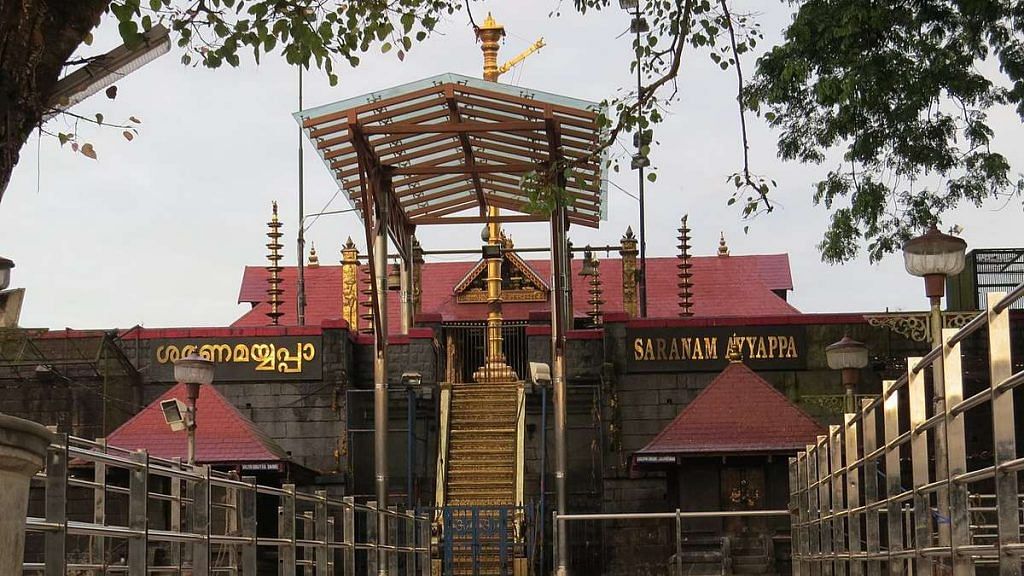Bengaluru: Facing a severe financial crisis, Kerala’s temples are not just turning to God for help but also the Reserve Bank of India (RBI). More than 1,200 temples attached to the Travancore Devaswom Board (TDB) are looking at ways of monetising their gold to tide over the crisis brought on by the Covid-19 pandemic.
N. Vasu, president of the TDB, told ThePrint that the temples are looking at three options — either pledge the gold with the Reserve Bank of India for a loan, deposit them under the Modi government’s Gold Monetisation Scheme or both.
He also said that the Travancore board, an autonomous body that administers 1,248 temples across six districts of Kerala, including the iconic Sabarimala temple, is still working out the quantity of gold that needs to be monetised.
“We are facing a major crisis. In the last five months, since the temples have closed, we have incurred losses of around Rs 300 crore,” Vasu told ThePrint. “Our options right now are to pledge the gold for loans that would give us immediate cash or to deposit them as gold bonds under the Gold Monetisation Scheme. These gold bonds would yield an annual interest of 2.5 per cent.
“We have sought clarification from the Union finance ministry on the loan as well the gold scheme,” Vasu added.
The TDB was among the 10 temple boards from across the country whose representatives met with central government agencies on 22 August on ways to tide over the monetary crisis.
“During the meeting, we were advised and encouraged to use the Gold Monetisation Scheme launched by the Modi government in 2015,” Vasu said.
The Gold Monetisation Scheme, launched in 2015, treats gold as a term deposit. It provides beneficiaries an annual interest, decided by the government. The interest earned is exempt from tax.
Also read: Why participate in bidding, then question the game — Tharoor asks Kerala govt on airport row
‘Quantity of gold yet to be decided’
According to TDB officials, nearly 1,000 kg of gold that is not being used for the daily temple rituals, and which do not have antique value, will be pledged against the loans or used in the scheme.
A senior temple official said several devotees donate gold as part of their offering to their deities. “Gold used to adorn the deity will remain untouched. Other items like gold bars and coins will be pledged. The gold will be melted, purified and then deposited in the RBI,” the official said.
“All the temples under the TDB will contribute from their treasury,” Vasu said. “We are in the process of assessing how much gold and articles we have in our possession across all the temples. Our officials have been dispatched to send in their assessment reports. The valuation and indenting process will continue until the end of September.”
The process to pledge such large amounts of gold, however, is not simple and is fraught with legal hurdles. The Kerala High Court has to grant permission for any high-value transaction by the “devaswom” boards for non-temple utilisation.
“We have already approached the courts,” Vasu said.
The TDB can, however, take heart from the fact that some of the wealthiest temples in the country are already part of the Gold Monetisation Scheme.
The Thirumala Tirupati Devasthanam (TTD), which manages the world’s richest Hindu temple of Lord Venkateshwara, had in 2017 deposited 2,780 kg of gold with the State Bank of India under the long-term deposit scheme. The deposit, which was made for 12 years, ensures an interest of 2.5 per cent each year for the TTD. The Shirdi Sai Baba temple too had pledged 200 kg of gold in 2015 as part of the scheme.
Kerala temples in trouble
One of the iconic and popular temples under the TDB is the Sabarimala temple, which attracts around 3 crore visitors a year. During peak season, between September and January, it receives more than Rs 100 crore in donations.
The temple, shut for the past five months, and with no signs of its reopening, is facing a major cash crunch.
A Devaswom Board official told ThePrint that on an average, the running costs of the Sabarimala Temple, including salaries, is around Rs 50 crore a month.
Kerala-based temple activist Rahul Eswar said that since the Sabarimala protests began in 2019, the iconic temple’s earnings have seriously dipped.
“This is a serious issue,” Eswar told ThePrint. “The Pinarayi government had promised to give Rs 100 crore to the Sabarimala temple. Until date, only Rs 30 crore has been released. The pending Rs 70 crore may not have been given due to the pandemic.
“The other 1,200-odd temples have no revenue as such and their employees have to be paid, “ Eswar added.
Also read: Kerala not reporting ‘nearly half’ of its Covid deaths, expert panel says process ambiguous
